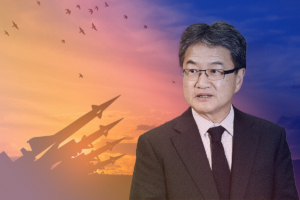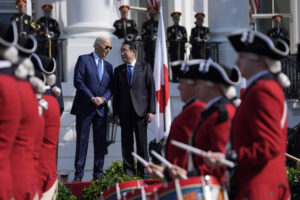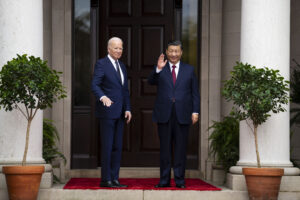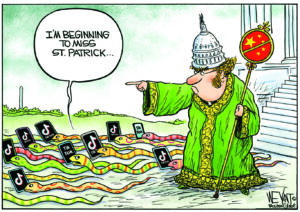Communist China Turns 60 — and Reveals Its Insecurities
What could and should have been celebrated this week in Beijing is the resumption of effective power in the People's Republic by the modernizer Deng Xiaoping.It was only yesterday that the Gang of Four was ruling China. That is worth remembering.
The 60th anniversary of Communist China was being celebrated this week, but 60 years ago was merely the victory over the Nationalist Chinese. The People’s Republic was proclaimed following the expulsion of the last Chinese Nationalist military forces to Taiwan, a Chinese island that had belonged to Japan since 1895.
Taiwan was then declared by the Nationalists still part of the original Republic of China, as founded by Sun Yat-sen in 1912 — successor to the last of China’s imperial dynasties.
Gen. Chiang Kai-shek, who replaced Sun Yat-sen after Sun died in 1925, was one of the Allied “Big Four” of the Second World War, together with Winston Churchill, Franklin Roosevelt and Stalin. He was also supreme commander of Allied War Zone China, which included India and Southeast Asia. His republic after 1950, even in Taiwan, continued to claim to be the legitimate government of all China, a claim supported for many years by the United States.
What could and should have been celebrated this week in Beijing is the resumption of effective power in the People’s Republic by the modernizer Deng Xiaoping, who was purged by Mao in April 1976 on the urging of the Gang of Four — which included Mao’s fanatical wife, Jiang Qing.
In September 1976, Mao died. The Gang of Four was purged. Deng Xiaoping proved to be the most influential of the leaders who reclaimed the leadership of China, pursuing what had originally become known as Deng’s “Four Modernizations.” These included reform of the economy, de-collectivization of agriculture, the creation of special foreign investment zones and reconciliation with the West.
Contrary to what commonly is said by the friends of Henry Kissinger and Richard Nixon, it was China that took the initiative in recognizing the United States, not the contrary, establishing formal relations in January 1979. That was the beginning of modern China, 30 years ago — not 60.
This résumé of recent history is worth reflection, because the biggest of all questions to be asked about China today is: Where will China be 30 years in the future?
Nearly every comment being published on China’s celebration of its brilliant successes during the past 30 years has in one way or another raised the question of the future of a country that once was the most ideologically driven of major powers, but today has no governing ideology, or philosophy, or mobilizing goals.
This above all threatens the governing Communist Party. As I have argued before in this space, the Communist Party no longer possesses a real justification for running the country. It is in a certain respect an illegitimate government. Its only real claim to rule is that it’s already ruling — it leads because it has always led, at least in living memory. (But above a certain age, everyone’s memories in China include the Gang of Four, the Cultural Revolution and its mad excesses, the purges, the crazed policies of sending officials to work the farms, and peasants to — ostensibly — run the government, the backyard steel-making and economic and industrial policies based on delusion.
What if bad times come back? The government has thus far weathered the consequences of the world economic crisis, but there is undoubtedly more to come. Suppose the existing prosperity collapses, the great infrastructure and industrial plans fail, living standards plunge?
The anniversary celebrations have made much of China’s military power. It has 125 million men under arms, 700 tanks, and 2,300 planes in its air force (including “Chinese” fighter jets that owe nearly everything to Russia and Israel), and it is building up its aeronautical industry. The navy has 60 submarines, plus six more with nuclear missiles. What is all this for?
Obviously it is supposed to counter the United States, and if it came to that, to counter Russia or India. More realistically, it lends weight to China’s claim on Taiwan, certain islands in the South China Sea, and its repression of Tibet, and of its non-Han national minorities. Most of all, this enormous force is meant to enforce China’s claim to world respect.
This brings one other thing to mind. The most powerful force in a nation, particularly in the absence of a motivating ideology or mission, is nationalism. Building modern aircraft and ships is an expensive claim to respect, but likely to be appreciated by the Chinese people. That undoubtedly is what motivates the regime.
A French specialist, Valérie Niquet of the French Institute of International Relations, notes that this grandiloquent display of military power has been combined this week with a huge deployment of police, and a shutdown of civilian circulation in Beijing. It is meant to impress the world with Chinese power, but at the same time it reveals the Chinese government’s insecurity.
Visit William Pfaff’s Web site at www.williampfaff.com.
© 2009 Tribune Media Services Inc.
Your support matters…Independent journalism is under threat and overshadowed by heavily funded mainstream media.
You can help level the playing field. Become a member.
Your tax-deductible contribution keeps us digging beneath the headlines to give you thought-provoking, investigative reporting and analysis that unearths what's really happening- without compromise.
Give today to support our courageous, independent journalists.









You need to be a supporter to comment.
There are currently no responses to this article.
Be the first to respond.